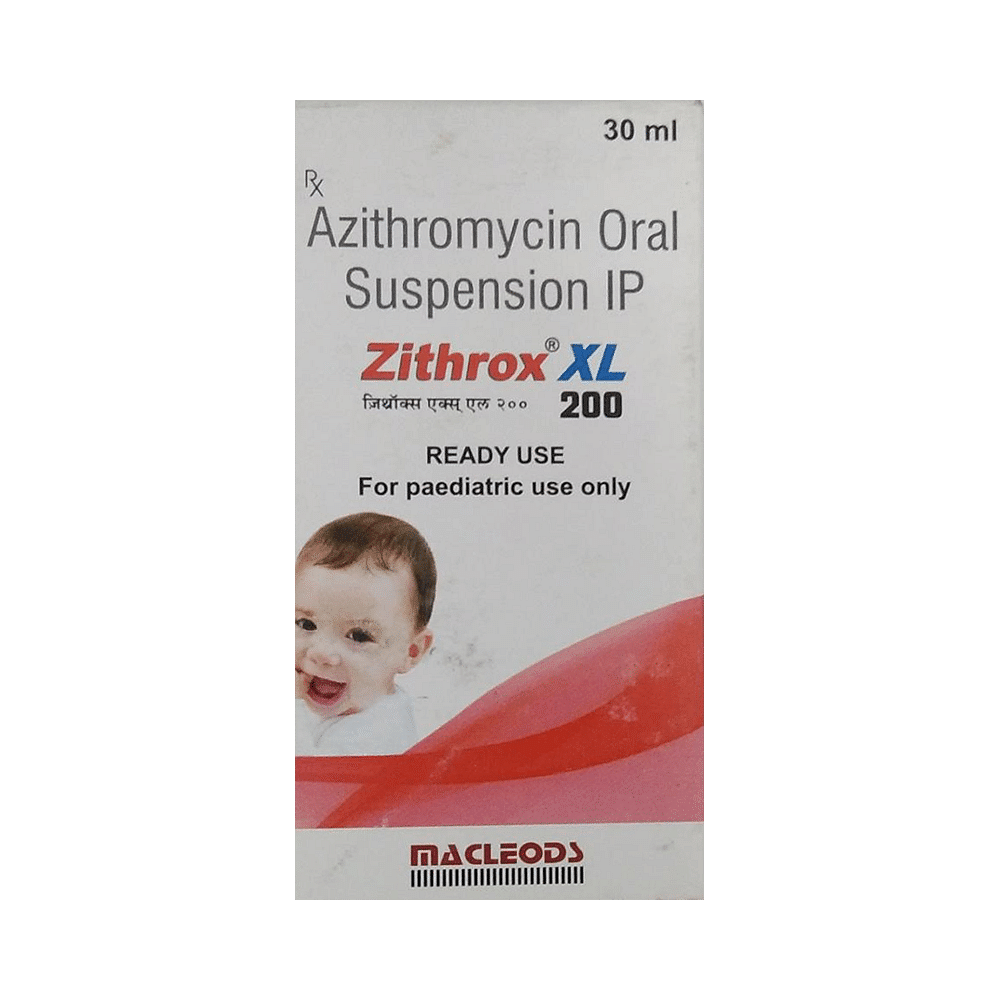
Aziford 200 Dry Syrup
Manufacturer
Leeford Healthcare Ltd
Salt Composition
Azithromycin (200mg/5ml)
Key Information
Short Description
Aziford 200 Dry Syrup is an antibiotic medication used to treat a wide range of bacterial infections in children.
Dosage Form
Dry Syrup
Introduction
Aziford 200 Dry Syrup is an antibiotic medication commonly given to children for the treatment of a wide range of bacterial infections targeting the ear, eyes, nose, throat, lungs, skin, and gastrointestinal tract.
Directions for Use
Give Aziford 200 Dry Syrup with food to avoid an upset stomach. Encourage your child to drink plenty of water in case diarrhea develops as a side effect.
Safety Information
Side Effects
No common side effects listed.
Interacting Medicines
Astemizole Disopyramide Ebastine Lovastatin
How it works
Aziford 200 Dry Syrup is an antibiotic. It works by interfering with the synthesis of essential proteins required by bacteria to perform important functions. By doing so, it stops the infection-causing bacteria from growing further and prevents the infection from spreading.
Quick Tips
Your child must complete the entire course of this medicine. Stopping too soon may cause the bacteria to multiply again Give Aziford 200 Dry Syrup with food to avoid an upset stomach Encourage your child to drink plenty of water in case diarrhea develops as a side effect Only give Aziford 200 Dry Syrup to your child for their current infection. Never save medicine for future illnesses Stop the medicine and contact the doctor immediately if your child develops an itchy rash, facial swelling, and breathing difficulties soon after the intake
Related Medicines

Azee XL 200 Dry Syrup Peppermint

Azatra Dry Syrup

Azilide 200mg/5ml Dry Syrup

Azimax XL 200mg/5ml Dry Syrup

Azitru 200mg/5ml Dry Syrup

Coraz 200mg Dry Syrup

Azenas 200mg/5ml Dry Syrup

Zithrox XL 200mg/5ml Dry Syrup

Aziclub 200mg Dry Syrup

Zithromin 200mg Dry Syrup
Frequently asked questions
What to do if too much of Aziford 200 Dry Syrup is given by mistake?
If an extra dose of Aziford 200 Dry Syrup is accidentally given, it is unlikely to cause harm. However, if you suspect that too much has been given, seek immediate medical attention from a doctor. Overdose may lead to unwanted side effects and potentially worsen the condition.
Are there any serious side effects of Aziford 200 Dry Syrup?
Some severe side effects associated with Aziford 200 Dry Syrup include persistent vomiting, kidney damage, allergy, diarrhea, and severe gastrointestinal infections. If you or your child experience such symptoms, consult a doctor for guidance.
Can other medications be taken with Aziford 200 Dry Syrup?
Aziford 200 Dry Syrup may interact with other medicines or substances. Inform your doctor about any medications being taken before starting Aziford 200 Dry Syrup. Also, consult your doctor before giving any medication to your child.
Can vaccinations be given while on treatment with Aziford 200 Dry Syrup?
Antibiotics generally do not interfere with vaccines or cause adverse reactions in children who have just been vaccinated. However, children taking antibiotics should avoid getting vaccinated until they recover from the illness. As soon as your child feels better, the vaccine can be administered.
What lab tests are required while taking Aziford 200 Dry Syrup on a long-term basis?
The doctor may recommend periodic kidney function tests and liver function tests to monitor your or your child's condition.
Can Aziford 200 Dry Syrup affect digestion?
Children often experience stomach upset when taking medicines, and antibiotics can disrupt the balance of good bacteria in the gastrointestinal tract. Aziford 200 Dry Syrup may kill off beneficial bacteria along with harmful ones, increasing the risk of developing other infections. If diarrhea occurs while on Aziford 200 Dry Syrup, consult your doctor for guidance.
Why is Aziford 200 Dry Syrup given for 3 days?
The duration of treatment depends on the type and severity of the infection being treated, as well as the age of the patient. Aziford 200 Dry Syrup may be prescribed for a single dose or for a specified number of days, so it is essential to follow the regimen advised by your doctor.
What should be avoided while taking Aziford 200 Dry Syrup?
It is recommended that patients taking Aziford 200 Dry Syrup avoid taking antacids with this medicine, as it can affect the overall effectiveness of Aziford 200 Dry Syrup. Additionally, exposure to sunlight or tanning beds should be avoided, as Aziford 200 Dry Syrup increases the risk of sunburn.
Is Aziford 200 Dry Syrup a strong antibiotic?
Aziford 200 Dry Syrup is an effective antibiotic with a longer half-life compared to other antibiotics. This means it stays in the body for a longer time, typically requiring only once-daily dosing for a short span of treatment.
Can Aziford 200 Dry Syrup lead to yeast infections?
Some people may develop fungal or yeast infections known as thrush after taking Aziford 200 Dry Syrup. Antibiotics can disrupt the balance of good bacteria, making it easier for fungal growth. Inform your doctor if you experience symptoms like vaginal itching, discharge, or a white patch in the mouth or tongue.


